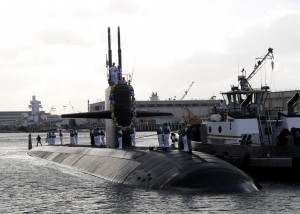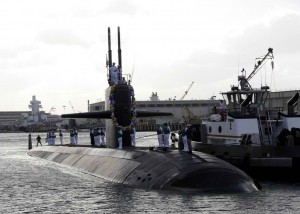By ROLAND G. SIMBULAN
 DESPITE China’s emergence as an economic power, it should not replace the United States as the key partner of Southeast Asian countries as U.S. military presence is still needed to combat terrorism in the region, an American security analyst said Friday.
DESPITE China’s emergence as an economic power, it should not replace the United States as the key partner of Southeast Asian countries as U.S. military presence is still needed to combat terrorism in the region, an American security analyst said Friday.
“The U.S. remains a key player in the Asia-Pacific region despite the rise of China as an economic powerhouse and that it should therefore be included in any Asian bloc where China, Russia and India are present. It would be a mistake if the U.S. were to be left out,” Dr. Katy Oh Hassig of the Institute of Defense Analyses (IDA) said in her paper, “The US is IN Asia,” presented during a forum on Asia-Pacific security held at the Dusit Thani Manila Hotel in Makati.
Hassig was reacting to an emerging view among some countries of the Association of Southeast Asian Nations that the United States should be replaced by China as their key partner in the region since the latter is already their leading trading partner, and soon even the leading investor and donor country.
She pointed out that the United States, through its Pacific Command (PACOM) based in Hawaii, still has the largest military presence on land and sea in the Asia-Pacific region and is therefore in the best position to counter any terrorist threat.
Timed to coincide with the 17th ASEAN summit in Vietnam last week, the forum was attended by intelligence officers and analysts of the Department of National Defense and the Philippine National Police, representatives of various foreign embassies in Manila, and representatives from various foreign intelligence organizations.
Hassig’s view, however, is contradicted by a 2005 prognosis of decline, “Mapping the Global Future: Report of the National Intelligence Council’s 2020 Project” by the U.S. National Intelligence Council—considered the very center of U.S. strategic thinking and which includes the Central Intelligence Agency—which predicts that by 2020, the U.S.’ relative power position that is now in a state of decline, “would be eroded.”
The report, which was declassified by the CIA website, admits that the U.S.’ global war on terror has in fact eroded U.S. power and credibility in the region. For the first time, the ASEAN-plus-three (China, Japan and South Korea) summit in Vietnam is conducting multilateral talks visioning Asian regional security that is not U.S.-led or perhaps even excluding the U.S.
The other speakers in the forum agreed that “the political and nonmilitary approaches in countering terrorist and security threats” in the region were still lagging far behind the military approach being harnessed by the United States and its allies.
Although advertised to present an Asia-Pacific perspective, the event was largely dominated by threat assessments presented from the point of view of the US government and the conservative elements of its allies in the region.
Retired U.S. Rear Admiral Rick Porterfield who served as director of Naval Intelligence presented an alarming picture of the post-Cold War and post-9/11 era which, he said, was continuously threatened by Islamic terrorism.
Hekmat Karzai, who heads the Center for Conflict and Peace Studies in Kabul, Afghanistan, presented the anatomy of Afghan insurgency which he described as nonmonolithic, with at least five major factions including the Taliban.
He presented the U.S. and Afghan governments’ strategy of improving the capabilities of security institutions as well as institutions of civilian governance.
Karzai admitted that the U.S. military’s heavy use of aerial power was inflicting heavy civilian casualties among the Afghan people, thus serving as “the political oxygen of insurgents.”
Khuram Iqbal of the PaK Institute for Peace Studies in Pakistan also admitted that the “collateral damage” on civilians inflicted by the use of U.S. air power, while considered a “tactical success,” was also a “strategic failure.”
He said this was because it was alienating the population and becoming a strong motivation for recruiting Pakistan Taliban fighters as well as internationalizing the conflict.
Shanaka Jayasekara from Sri Lanka, an expert on terrorist fund-raising, weapons procurement and support networks, described how the Tamil Tiger movement (LTTE) was crushed and decimated militarily through a massive military offensive by the Sri Lankan government, while its international network of Tamil diaspora has become splintered.
Jayasekara also said there is an LTTE-owned shipping company based in Cebu City, the London Shipping Co., whose assets, which include the MV Lillibeth, are being sought for recovery and repatriation by the Sri Lanka government is trying to recover and repatriate.
Filipino journalist Arlyn de la Cruz who wrote the book Witness to Terror said the Abu Sayaff has highly autonomous groups operating in Sulu and Basilan. She revealed that in her own experience in Mindanao, she “does not find any real difference between the Abu Sayyaf, the Moro National Liberation Front and the Moro Islamic Liberation Front.”
She explained that the strong clan system in the area accounts for this and for the perception that government forces pursuing the ASG are “outsiders intruding in the community.”
The forum was organized by the Council for Asian Transnational Threat Research; the Philippine Institute for Peace, Violence and Terrorism Research; the Asia-Pacific Regional Security Forum; and the IDA. The IDA is funded largely by U.S. defense-related agencies and has been doing research “in support of the U.S. Department of Homeland Security, the National Aeronautics and Space Administration, and the Director of National Intelligence.”
